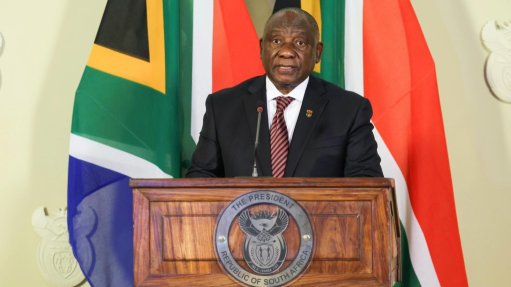From ‘Dear John’ to unity
After the dear John letter that never was, six Democratic Alliance (DA) members have taken up their positions in President Cyril Ramaphosa’s Cabinet alongside their counterparts from the African National Congress (ANC) and several of the nine other political parties constituting the new government of national unity, which is set to steer the South African State over the next five years.
If you have just landed from Mars, Ramaphosa sent a scathing letter to DA leader John Steenhuisen, admonishing him for what he saw as his party’s shifting of goalposts in negotiations for the new government. The salutation was “Dear John” – not “Dear Honourable Steenhuisen”, which some felt would have been more fitting for an elected MP.
After Ramaphosa’s zinger of rebuke, it seemed he was ready to roll without the DA, especially since the ANC and the other parties it had been negotiating with – minus the DA – had more than 50% of the seats in the National Assembly. That’s why the jesters among us had a field day with the President’s “Dear John” greeting, hinting it was game over for negotiations with the DA.
Now, if you are wondering where this whole “Dear John” thing came from, buckle up for a bit of linguistic history. During World War II, soldiers on the battlefront would eagerly await mail from their sweethearts back home. Sometimes, instead of lovey-dovey letters, they would get a “Dear John” note. Something like: “Hey soldier, while you were out there fighting the good fight, I found someone else.”
But why the name John? It’s believed to have emerged from the commonness of the name among American soldiers at the time of that big war, which led to it being the generic placeholder for a boyfriend or husband. Initially, “Dear John” signified an unfortunate soldier receiving a letter from a wife or girlfriend announcing the termination of their relationship. Over time, “Dear John” has entered broader usage to describe any letter or message informing someone of the end of a relationship, especially a romantic one.
So, when Ramaphosa dropped that “Dear John” on Steenhuisen, it was like a modern- day political twist on a classic breakup trope.
But all that’s water under the bridge. Ramaphosa and Steenhuisen, along with the leaders of the other political parties in the new government, now stand united, ready to lead South Africa out of its current challenges: poverty, unemployment, inequality, lopadshedding, crime . . . you name it.
As his Agriculture Minister, Ramaphosa will have to correspond with Steenhuisen from time to time. Will he continue to address him as “Dear John”? Or will he opt for “Comrade John”, a term the ANC seems to reserve for its allies? Just look at Jacob Zuma’s journey. When he was in their inner circle, he was Comrade Jacob Zuma. But after parting ways to form the uMkhonto we Sizwe party, that special title slipped away.
It’s a mystery to me why ANC members still stick with ‘Comrade’ – 35 years after the collapse of the Berlin Wall. I have been to Russian twice – spending a week on each visit – and not once did I hear anyone being called Comrade.
A cartoonist from one of South Africa’s top newspapers captured the absurdity of it all when Russian President Vladimir Putin visited South Africa in 2006. In the cartoon, Putin and former President Thabo Mbeki are cruising in an open-top vehicle in the Kruger National Park, passing a herd of rhinos. The animals are all emblazoned with the label ‘SACP’ on their sides. Turning to Mbeki, Putin quips: “I thought those were extinct!”
Speaking of comrades, maybe it’s Zuma and his uMkhonto we Sizwe crew, as well as those of their ilk in the other leftist parties, that the ANC should be tagging with ‘Comrade’. They are the ones gunning for a radical agenda: land expropriation without compensation, nationalisation of mines and banks, and all that jazz.
On the other hand, despite the socialist chatter on its website and in its literature, the ANC has pursued business-friendly policies. It’s much like dancing with capitalists and comrades at the same party.
Article Enquiry
Email Article
Save Article
Feedback
To advertise email advertising@creamermedia.co.za or click here
Announcements
What's On
Subscribe to improve your user experience...
Option 1 (equivalent of R125 a month):
Receive a weekly copy of Creamer Media's Engineering News & Mining Weekly magazine
(print copy for those in South Africa and e-magazine for those outside of South Africa)
Receive daily email newsletters
Access to full search results
Access archive of magazine back copies
Access to Projects in Progress
Access to ONE Research Report of your choice in PDF format
Option 2 (equivalent of R375 a month):
All benefits from Option 1
PLUS
Access to Creamer Media's Research Channel Africa for ALL Research Reports, in PDF format, on various industrial and mining sectors
including Electricity; Water; Energy Transition; Hydrogen; Roads, Rail and Ports; Coal; Gold; Platinum; Battery Metals; etc.
Already a subscriber?
Forgotten your password?
Receive weekly copy of Creamer Media's Engineering News & Mining Weekly magazine (print copy for those in South Africa and e-magazine for those outside of South Africa)
➕
Recieve daily email newsletters
➕
Access to full search results
➕
Access archive of magazine back copies
➕
Access to Projects in Progress
➕
Access to ONE Research Report of your choice in PDF format
RESEARCH CHANNEL AFRICA
R4500 (equivalent of R375 a month)
SUBSCRIBEAll benefits from Option 1
➕
Access to Creamer Media's Research Channel Africa for ALL Research Reports on various industrial and mining sectors, in PDF format, including on:
Electricity
➕
Water
➕
Energy Transition
➕
Hydrogen
➕
Roads, Rail and Ports
➕
Coal
➕
Gold
➕
Platinum
➕
Battery Metals
➕
etc.
Receive all benefits from Option 1 or Option 2 delivered to numerous people at your company
➕
Multiple User names and Passwords for simultaneous log-ins
➕
Intranet integration access to all in your organisation

















